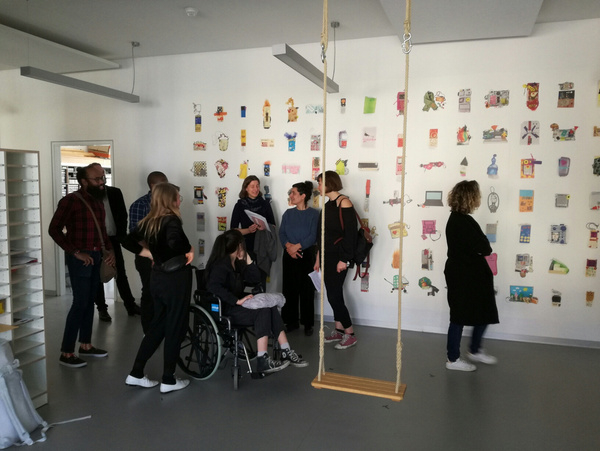 Foto: Graduiertenschule
für deutsche Fassung bitte hier klicken
Dear Ladies and Gentlemen, dear friends,
in this edition of our newsletter, we introduce the new fellows and associates of the Graduate School, who started their internship in April. Welcome!
|
|
Fellows at the Graduate School
|
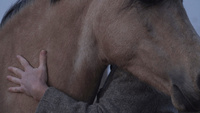 Foto: Yalda Afsah
|
|
Yalda Afsah
Tourneur – Kentaur – Kaftar
The trilogy Tourneur – Kentaur – Kaftar addresses the human-animal relationship. Based on three examples – bullfighting, horse dressage, and training pigeons in artful flying – the trilogy gives insights into how the boundary between care and control gets blurred, as humans identify with animals and devote great attention to them, while also submitting them to violence, discipline and dominance. The films contest the assumption that nature put humans in the place of power and emphasise the artificial character of such claims in the case of dressage.
Yalda Afsah (*1983) grew up in Berlin and studied at the Berlin University of the Arts, the Burg Giebichenstein University of Art and Design in Halle, as well as at the California Institute of the Arts. Based on the practice of documentary, her work as a filmmaker raises questions regarding the difference between construction and reality - and blurs the borders between them. She received several awards for her artistic work and her films were screened on festivals such as Locarno Film Festival, New York Film Festival, Internationale Kurzfilmtage Winterthur and at Neuer Berliner Kunstverein.
yaldaafsah.com/en/
|
Anthony R. Green
It Must All Be Done In Darkness
It Must All Be Done In Darkness is a multimedia project dedicated to Harriet Jacobs, author of “Incidents in the Life of a Slave Girl” (1861). As an enslaved woman, Ms. Jacobs suffered violent abuse, fought for her freedom, and spent seven years in isolation, hiding from her persecutors in an attic crawl space. In an effort to tell Ms. Jacobs‘s story with depth and respect, Green will collaborate with MRI scientists and psychoanalysts on generating still and moving imagery as well as birthing sounds, movements and music.
Anthony R. Green is a composer and performer invested in social justice. His practice of continuous questioning is centered on hyperbole, the embodiment of injustice, and the metaphysics of the oppressed. His work has, among many other places, been presented at Tivoli Vredenburg (Utrecht), studio ilka theurich (Hannover), Cité de la musique et de la danse (Strasbourg), Symphony Space (New York), Spectrum (New York), LiteraturHaus (Copenhagen), The Shoe Factory (Nicosia), and The Bemis Center for Contemporary Arts (Omaha).
www.anthonyrgreen.com
more
|
|
 Foto: Colin Conces
|
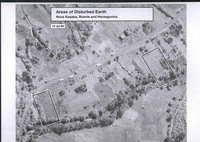 Foto: CIA Satellite
|
|
Didem Pekün
Disturbed Earth
Disturbed Earth is the term US Security Council analysts used to name what they saw on aerial photos that evinced mass graves at Srebrenica.The genocide could have been prevented; UN forces were informed, yet did notintervene, as they stood paralysed by the unending back and forth of bureaucratic protocol. So refugees seeking shelter in the UN base camp were handed over to be transported to a certain death.
Based on the close study of historical documents, the project Disturbed Earth will reconstruct the conditions of the disaster via a montage of image and text material as well as a reconstruction of the aforementioned bureaucratic dance in a choreographed manner, displayedin a multi-screen installation. Institutional incompetencelaid bare: the tragedy of bureaucracy hauntshistory. The project seeks to address the horiffic contradiction that the UN, set up to secure peace via the rule of law, failed to deliver justice as the slow workings of this very law precluded timely interventions. So the project asks: What infrastructure wouldit take to stop events from accelerating beyondthe irreversible point of historical regret?
In her work Didem Peküncombines research and practice. In her essay films, she addresess how violence and displacement define and destroy life. Her documentaries and video installationshave been showninternationally and received different awards. She is a founding member of Center for Spatial Justice (MAD). She holds a BA in Music from SOAS, an MA in Documentary from Goldsmiths, and a practice-based PhD in Visual Cultures from Goldsmiths, University of London.
www.didempekun.com
more
|
Romily Alice Walden
Foregrounding the Sick Woman
Foregrounding the Sick Woman: Narratives of Disability and Embodiment in Western post-Internet Culture is a research-led, practice-based project that explores the intersection of sickness, gender and technology. Four key areas of research will be developed under the headings: connection, performance, protest and futures; these will be investigated through autoethnographic writing, open-forminterviews, the production of artwork and accessible public programming. This project centersonthe gendered and disabled experience, working to bring sickness and disability out of private homes into the public space.
Romily Alice Walden is a transdisciplinary artist whose work formulatesa queer disabled perspective on the fragility of the body. Her work has been shown throughout the UK, Europe and North America in solo and group exhibitions. Her practice spans sculpture, installation, video and printed matter.
romilyalicewalden.com
|
|
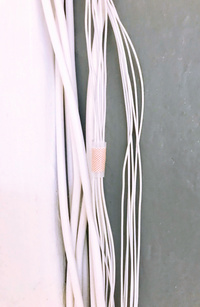 Foto: Romily Alice Walden
|
|
Associates at BAS
|
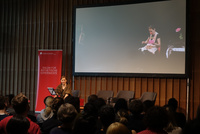 Foto: Malte Spitz
|
|
Neslihan Arol
A Feminist Inquiry into Shadow Play: Can Karagöz Become a Feminist?
Karagöz is theprotagonist of the eponymous shadow puppet theatretraditionally practicedin Turkey. In 2009 it was inscribed in the UNESCO Representative List of the Intangible Cultural Heritage of Humanity. In her artistic research project A Feminist Inquiry into Shadow Play: Can Karagöz Become a Feminist? Neslihan Arol seeks tore-evaluatethe male-dominated comedic tradition of Karagöz from an intersectional feminist perspective.As an art form, Karagöz has historically been associated with marginality and deviance. So can it represent gender in more expansive, progressive ways? Can themain characters Karagöz and Hacivat tell a feminist story? Or must they make wayforZennes (the name for all female characters in Karagöz plays)? Could there be totally new characters?
Neslihan Arol combines her artistic and academic work in a multifaceted practice: She created her solo work in clowning, stand-up comedy and meddahlık (a tradition of storytelling in Turkey), and performed in cities from Berlin to Vienna, Helsinki to Toronto. She is alsoa voice artist, and teaches clowning. She was an active member of the performance groups „gastkollektiv“ and „Clowns ohne Grenzen” for several years and continues to act in the plays of „Bühne für Menschenrechte“. Arol received her Masters in Film and Drama from Kadir Has University (Istanbul). For her PhD at the Faculty of Performing Arts at the Berlin University of the Arts she currently continues her research on the intersections between feminism and comedy through solo performance forms mentioned above.
|
Rindon Johnson
Alternative States of Being
Rindon Johnsonconductsa material linguistic study of Virtual Reality (VR), Augmented Reality (AR) and Mixed Reality (MR). His work raises such questions as: How do we as artists, critics, writers, scientists and thinkers interact with these mediums; what do we find in our employment of them? What might happen when changing realities is a commonplace activity? What of the social world might we thereby remake together?
Rindon Johnson is an artist and writer. He is the author ofNobody Sleeps Better Than White People (Inpatient Press, 2016), the virtual reality book Meet in the Corner (Publishing-House.Me, 2017) and Shade the King (Capricious, 2017).
www.rinjohnson.com
|
|
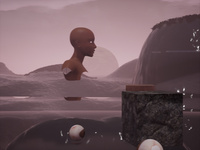 Foto: Rindon Johnson and Daata Editions
|
 Foto: Mariam Mekiwi und Mohamed Gaber
|
|
Mariam Mekiwi
El Markebba El Omm - Mothership
What can emerge from wreckage, leftovers, and errors? EL MARKEBBA EL OMM - MOTHERSHIP imagines a world where a female scientist (OMM) has to eat a man in order for her breasts to produce milk so she can feed the population of the Mothership. Origin: A female scientist (OMM) works in the Museum of Obstetrics and Gynaecology which houses a collection of most rare specimen obtained from her own operations on female bodies. With the help of her colleague and fellow scientist, she embarks on an experiment to create the Mothership and make her own body the ship‘s source of energy. Set in a futuristic space, the story is told in three parts, in filmic episodes orchestrated as a series of rituals. Amalgamated with science fiction, the film’s erotic fantastic narratives are queering epistemology and envisioning a post-patriarchal future.
Mariam Mekiwi (1987) is a filmmaker and film editor from Alexandria, Egypt. She completed her MFA in film at the Hochschule Für Bildende Künste in Hamburg (HfbK) in 2017. Her fiction film ‘Abl Ma Ansa’ premiered at the Berlinale’s Forum Expanded section in 2018 and was nominated for the First Steps Awards of the German Film Academy in the same year. Her films were screened on festivals such as Film Festival Oberhausen, Ayam Beirut Al Cinema’iya, Haifa Independent Film Festival and Sharjah Film Platform.
|
|